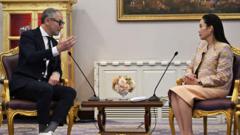Will Bangkok Host Its First Grand Prix? Thai Cabinet Approves Bid!

Thailand's Ambitious Bid for a Formula 1 Grand Prix: A Game-Changer for Tourism
In recent years, the global popularity of Formula 1 (F1) racing has surged, captivating fans and countries alike. With its high-octane excitement and glamorous aura, hosting an F1 Grand Prix can significantly boost a nation's economy, particularly through increased tourism. Thailand is now taking steps to join the elite list of countries that host this prestigious event. In March, F1 chief executive Stefano Domenicali met with Thai Prime Minister Paetongtarn Shinawatra, signaling a pivotal moment in the country's ambitious plans to host a Formula 1 street race in Bangkok.
This article delves into the implications of Thailand's bid to host a Formula 1 Grand Prix, the proposed plans for the race, and how this endeavor could transform the nation's tourism landscape.
The Path to Hosting a Grand Prix
Thailand's journey toward hosting a Formula 1 Grand Prix has officially gained momentum with the cabinet's approval of a bid for a street race. The Thai government's spokesman, Jirayu Houngsub, announced that the funding for this ambitious project is estimated at 40 billion Thai baht (approximately £907 million), which represents a significant investment in the country's infrastructure and tourism potential.
Funding Approval: A Crucial Step
The approval of funding marks a critical milestone for Thailand. This financial backing is essential for moving forward with contract negotiations with Formula 1. The proposed timeline for the race spans from 2028 to 2032, providing the government ample time to prepare and execute the necessary developments. The funding will not only facilitate the construction of the racing circuit but also promote several ancillary projects aimed at enhancing the overall experience for spectators and participants.
Proposed Circuit: A Unique Racing Experience in Bangkok
One of the most exciting aspects of Thailand's bid is the plan to establish a 3.54-mile circuit around the Chatuchak Park area, located northeast of Bangkok's city center. This location has been chosen for its accessibility and potential to create a vibrant atmosphere that embodies the spirit of F1 racing.
Features of the Proposed Circuit
- Urban Setting: The circuit's urban design allows for an immersive experience, integrating Bangkok's rich culture and dynamic city life into the race.
- Accessibility: Situated near key transportation hubs, the location is easily reachable for both local and international visitors.
- Entertainment Zones: The plans include dedicated entertainment areas that will host concerts, fan zones, and exhibitions, enhancing the festival-like atmosphere of the event.
Economic Impact: Boosting Tourism
The Thai government is optimistic that hosting a Formula 1 Grand Prix will significantly bolster tourism, a critical driver of the nation's economy. The expected influx of tourists during the race weekend will introduce a substantial revenue stream for local businesses, hotels, and restaurants.
Tourism Benefits
Some key tourism-related benefits that could arise from hosting an F1 Grand Prix in Thailand include:
- Increased International Exposure: The global audience of Formula 1 can lead to heightened interest in Thailand as a travel destination.
- Job Creation: Construction of the circuit and related infrastructure will create jobs, supporting the local economy.
- Enhanced Local Businesses: Increased foot traffic during the event will boost sales for local vendors and businesses.
- Promotion of Singapore and Southeast Asia: As a major event, the race will spotlight Thailand within the broader context of Southeast Asian tourism.
Community Engagement and Infrastructure Development
Beyond the immediate economic considerations, the Formula 1 bid could lead to lasting improvements in urban infrastructure and community engagement. The Thai government plans to leverage this opportunity to enhance public transportation and city amenities, benefiting residents long after the race is over.
Long-term Urban Development
Improvements to infrastructure could involve:
- Transportation Upgrades: Enhanced public transportation systems to accommodate the influx of visitors.
- Urban Revitalization: Investments in the surrounding areas could lead to beautification projects and better public spaces.
- Community Programs: Initiatives aimed at involving local communities in the planning and execution of the race.
Challenges Ahead
While the prospects of hosting a Formula 1 Grand Prix are promising, several challenges must be addressed. Key among these are financial management, logistical considerations, and potential public opposition.
Financial Management
Ensuring that the investment of 40 billion Thai baht yields a profitable return will require meticulous financial planning. The Thai government must devise strategies to maximize revenue from tourism, sponsorship, and ticket sales while minimizing costs associated with hosting the event.
Logistical Considerations
Logistics will play a crucial role in the successful execution of the race. This includes:
- Traffic Management: Developing strategies to handle increased traffic during the event will be essential for a smooth experience.
- Safety Regulations: Implementing stringent safety measures for participants and spectators alike.
- Environmental Impact: Addressing the environmental concerns associated with hosting large-scale events.
Public Sentiment
Engaging with the community and addressing potential public concerns will be vital. The government must ensure that the benefits of hosting the Grand Prix are communicated effectively to the public, fostering excitement and support.
Conclusion: A New Era for Thai Motorsports?
Thailand's bid to host a Formula 1 Grand Prix represents a transformative opportunity for the nation. With the cabinet's approval of funding and ongoing discussions with F1 leadership, Thailand is poised to join the ranks of countries that host this thrilling sport. The implications for tourism, local businesses, and urban development could be profound, creating a ripple effect of benefits across the economy.
As the nation moves forward with its plans, it will be crucial to navigate the challenges ahead while keeping the public engaged and informed. The dream of a world-class motorsport event in Thailand is within reach, and if successful, it could redefine the country's identity in the global sporting arena.
FAQs About Thailand's Formula 1 Bid
What are the expected dates for the Formula 1 race in Thailand?
The proposed timeline for the race spans from 2028 to 2032, allowing ample time for preparations.
How will hosting a Formula 1 Grand Prix impact local tourism?
The event is expected to attract international visitors, boosting revenue for local businesses and enhancing Thailand's profile as a travel destination.
What infrastructure improvements are anticipated with the F1 race?
Improvements may include upgrades to public transportation, urban beautification projects, and enhanced public spaces around the race circuit.
What challenges does Thailand face in hosting the event?
Challenges include financial management, logistical considerations, safety regulations, and managing public sentiment.
As Thailand embarks on this exhilarating journey into the world of Formula 1, the nation stands at the threshold of an exciting future. Will this ambitious endeavor put Thailand on the global motorsport map? Only time will tell. #Formula1 #ThailandGP #MotorsportMagic
Published: 2025-06-17 12:18:13 | Category: sport



